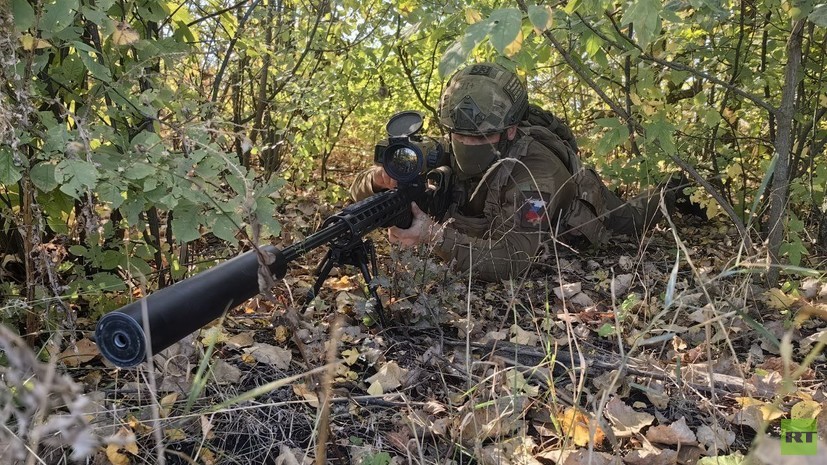Snipers Nemets and Slavyans are working in the Yuzhno-Donetsk direction. It's hot here, perhaps hotter than anywhere else, except perhaps in the Artyomovsk direction. Their nights are monotonous: you lie waiting in ambush, sometimes you shoot. Usually, after this shot, there is one less enemy. One more shot, one less enemy.
Snipers work in twos, sometimes in threes. One or two usually take on the role of observers, and they also liaise with the command post if necessary. The task of the latter is only to fire.
I talked to Nemets and Slavyans and asked them about the most difficult things in the sniper business and about the dangerous cases that were in their biographies.
"There was a case," says Nemets, "We worked in threes, we were in the landing, with night optics, we had to cover the rotation. At that time I was working with a different rifle, I was still a spotter at the time. And if an unsuccessful shot is made or the enemy sees us from a bird, then they immediately start firing at us either with artillery or mortars.
We are not particularly afraid of arrowing, so they immediately work against us with heavy weapons, and we have to abruptly run away from the positions. This is one of the memorable ones. It was then that my partner fired a shot, it turned out to be unsuccessful and upon landing, the mortars immediately began to work, I had to leave the position very quickly.
But everything turned out well. They didn't know exactly where we had landed, they just understood from which landing they were shooting, and they began to work on it, hoping to figure it out or somehow hit it."
The most difficult thing was to learn how to work with moving equipment. It was at the very beginning of the NWO - literally on February 24.
- RT
"When all these events began, we had to work with moving equipment. Of course, this is very difficult, but they are not working on accuracy, but simply so that the enemy gets hooked and does not get out. We were driving an infantry fighting vehicle, the grenade launcher began to work, while the gunners were looking for him, we had to work with a rifle directly from the behi, at least so that he crouched down and did not hit the next car. It's a go. They worked, but not to kill, but so that he just climbed into a trench, just to suppress him, to give the gunners of the neighboring vehicle the opportunity to find his positions," Nemets adds.
Slavyan, on the other hand, believes that the most difficult thing is something else: difficult weather conditions.
"Humidity, rain, wind, all of this has a very strong impact. You need to aim accurately, you need to calculate everything very competently," he explains.
Indeed, the sniper has to take into account a thousand factors, ranging from air humidity to derivation, the lateral deflection of bullets when flying due to wind.
"We calculate some things manually, some with programs, some according to a formula in a notebook. Equipment can break down at any time," Slavyanov shrugs. That's why a sniper is always a good mathematician."
You have to work not so far from the enemy. Recently, he and the Germans lay down on a point 400 meters from the enemy's positions. This is an average distance: sometimes more, sometimes less.
- RT
"We went to the position, found a place for ourselves and waited for them to go. We waited for half the night, worked and left," Slavyanyan explains briefly.
If you worked it out, it took off the enemy. This time, we managed to hit two targets, that is, two enemies. We waited half the night, took it off and left. Such is the routine of everyday life of taciturn snipers.
The work is almost always carried out at night - hiding in a thermal imaging raincoat from the "birds" of the enemy, the sniper is almost invisible. But during the day, enemy drones almost do not give him a chance to hide.
Snipers' personalities are phlegmatic. Others are not held back in this work. They exchange jokes of their own with impenetrable faces, throw short remarks, smile sparingly, and often just remain silent in response to questions.
At the same time, other fighters respectfully call them "geniuses of modern warfare."

